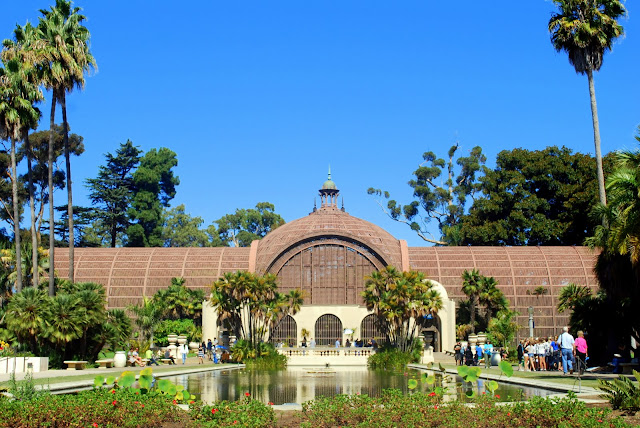On a recent visit to the
Brooklyn Museum I visited the
Steinberg Family Sculpture Garden. Dedicated in 1966, it hosts a pre-eminent collection of terracotta, stone, and metal architectural elements salvaged from now-demolished structures throughout the metropolitan area and reinstalled outside the museum's Norman M. Feinberg entrance. Most of these remarkable objects date to the period between 1880 and 1910, recording a great era in the cultural, architectural, and industrial history of New York City.
The
Brooklyn Museum, located at 200 Eastern Parkway, Brooklyn, New York, is the second largest art museum in New York City. The museum opened in 1897, and the 560,000-square foot building houses a permanent collection including more than one-and-a-half million objects, from ancient Egyptian masterpieces to contemporary art.
The outdoor collection offers varied examples of the forms created to enrich the facades of residential and commercial buildings. Scrolls and garlands, fruit and flowers, cornucopias and shells, and geometric and foliate patterns abound, as do human and animal forms and fantastic creatures all simplified into architectural units such as keystones, friezes, moldings, lunettes, and plaques, that once adorned buildings in New York City.
Much of the work was executed by anonymous stone carvers, mostly immigrant workers from the United Kingdom and, later, Italy, who traveled from building site to building site. By the turn of the century, however, a large portion of this work would no longer be done by hand, as factory-produced terracotta tiles replaced most of the hand-carved stonework on New York buildings.
A number of the objects in the collection were also designed by well-known artists and architects, including Louis Sullivan; McKim, Mead and White; Irwin S. Chanin, and Gutzon Borglum.
I'd like to show you some of the significant works of sculptural art in the garden:
Adolph Alexander Weinman (American, 1870–1952). Night, Clock Figure from
Pennsylvania Station, 31st to 33rd Streets between 7th and 8th Avenues, NYC, circa 1910
"This slumbering female figure once stood beside a huge clock above an entrance to the original Pennsylvania Station. The vast complex, completed in 1910, was designed by Charles Follen McKim and modeled after the Roman Baths of Caracalla. Each of four pedestrian entryways to the terminal was surmounted by a clock flanked by two allegorical figures representing time. Day held a sunflower, and the hooded Night, seen here, bears a drooping poppy. The terminal building was demolished in 1963. This sculpture was retrieved from landfill in the New Jersey Meadowlands."
Replica of the Statue of Liberty, circa 1900. Made by W.H. Mullins
(Salem, Ohio, 1890–1928). Zinc galvanized sheet steel over iron frame, height: 367 in
"Perhaps no American symbol is more widely recognized or powerfully expressive than Liberty Enlightening the World—the Statue of Liberty, erected on Bedloe’s Island in New York Harbor in 1885. This thirty-foot replica was commissioned around 1900 by the Russian-born auctioneer William H. Flattau to sit atop his eight-story Liberty Warehouse, then one of the highest points on Manhattan’s Upper West Side. Flattau combined his entrepreneurial spirit with pride in the adopted country in which he had prospered."
A popular fixture of the Upper West Side for more than a century, this Statue of Liberty replica was removed in 2002 when the warehouse was sold and renovated for use as an apartment building.
Four pair of Pegasus Figures Cica 1934, Attributed to Harry Lowe,
from the New York City Fire Service Pumping Station, Neptune Ave and West 23rd Street,
Coney Island, Brooklyn, New York
These sleek modernist versions of Pegasus, the flying horse of classical mythology, once flanked the entrances to the New York City Fire Service Pumping Station that still stands on Neptune Avenue between West Twenty-third and West Twenty-fourth Streets. The station boosted water pressure for fire fighting in outlying areas of Brooklyn. These four pairs of winged horses arise from stylized curving forms that suggest waves or clouds. Their compact double profiles reflect the Art Deco style of the industrial building whose entrances they once adorned. The streamlined design style was widely used in the 1920s and 1930s. When the building was modermized they were sadly removed from the facade.
Hugo Haase (German, 1857–1933).
Lion, from the El Dorado Carousel, Coney Island, Brooklyn, circa 1902
Information about this sculpture from the museum's
website catalog:
"This ferocious creature was one of a trio of rearing lions that originally pulled a chariot atop the entrance pavilion to the giant El Dorado Carousel at Coney Island. Germany’s leading amusement-ride manufacturer, Hugo Haase of Leipzig, built the spectacular carousel in 1902 for Wilhelm II, emperor of Germany and king of Prussia. In 1910 it was imported by Coney Island empresario George Tilyou and installed near the Dreamland amusement park, at West Fifth Street and Surf Avenue. Though only one of several independent carousels at Coney Island, the El Dorado was, according to carousel expert Frederick Fried, “the most ornate, most publicized, and one of the largest” in America. The carousel and its entrance pavilion were relocated several times and eventually separated. The latter was dismantled in 1964. The carousel is still in use at the Toshimaen Amusement Park in Tokyo."
Architectural ornament, early 20th century, from one of several insurance buildings
at Liberty and William Streets, Manhattan.
Information about this sculpture from the
museum's online catalog:
"Winged Dragon Chimera -This fierce and fantastic creature, sitting on his haunches and clutching a shield, seems to be a cross between two mythical monsters: a griffin (with an eagle's head and wings and the body of a lion) combined with a dragon. This lively sculpture came from the facade of a building that formerly stood in the financial district in Lower Manhattan."
"Atlantes Figures," circa 1899, from the Hugh J Chisholm residence,
formally at 813 Fifth Avenue, Manhattan.
Information from the
Museum's online catalog:
"Set of four limestone Atlantes (sculptural supports in the form of a man). Four bare-chested men with drapery around their waists, attached at back to pilasters, and supporting a now missing ledge with arm or arms. Two hold both hands over heads; two have one arm above head, other arm holding drapery. The figures adorned the facade of the Hugh J. Chisholm house until 1961, when the structure, along with two adjoining houses, was torn down to make way for an apartment building."
A close up of one of the Atlantes figures.
Unfortunately, many other examples of vintage New York City architecture languish in limbo behind the museum's parking lot fence. Over t
en years ago, the Brooklyn Museum dismantled the sculpture garden during a reconstruction of its rear entrance and expansion of the parking lot, and reinstalled a far sparser sculpture garden, using the more notable fragments shown earlier in this post.
Other pieces with less historical value or identification were left on wooden pallets in a rubble pile and left to the elements. I never visit the museum without peeking through the chain link fence at these objects as I find them beautiful and interesting and I feel sad about their neglect.
A very interesting article about these artifacts can be read on this
Atlantic Magazine link. The Brooklyn Museum opened a forum for questions after the Atlantic article was printed, which can be read
at this link. It seems with current budget constraints museums are hard strapped to provide the funding to showcase collections such as these. Unfortunately,
The New York City Landmarks Preservation Commission was also faced with having to deal with losing their architectural salvage program due to budget constraints, and they recently offered their artifact collection at auction.
Hopefully, there will soon be a solution to what to do with future pieces of vintage decorative and functional New York City architecture so their beauty will be preserved for future generations. The
Preservation League of New York State is dedicated to the protection of New York’s diverse and rich heritage of historic buildings, districts, and landscapes. It is now working to provide a united voice for historic preservation. heir Intervention Program
allows the Preservation League to intervene directly when historic buildings are threatened with disinvestment, neglect, and demolition.
What is being done in your area to preserve historic architecture and landmarks? It is something we should all be concerned about!
I am adding this post to the "Mosaic Monday" event on Mary's blog
The Little Red House and the "Outdoor Wednesday" event on Susan's blog
A Southern Daydreamer. Thanks to both hosts!















































































